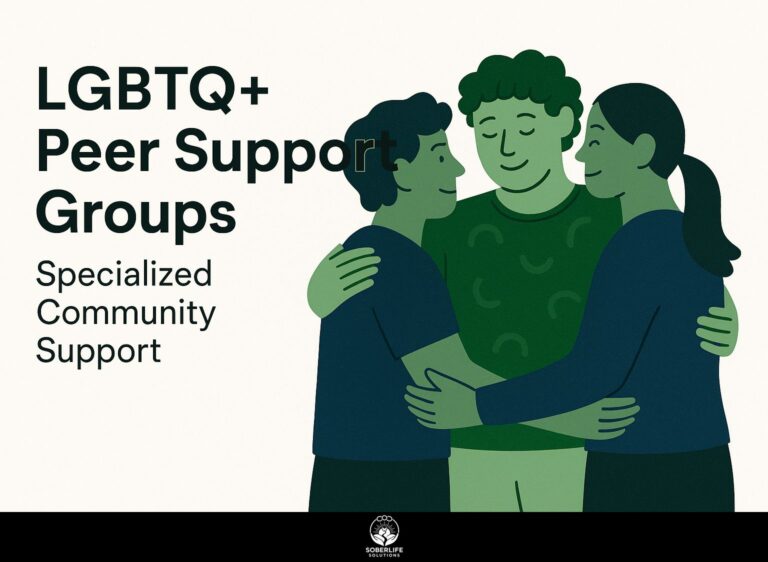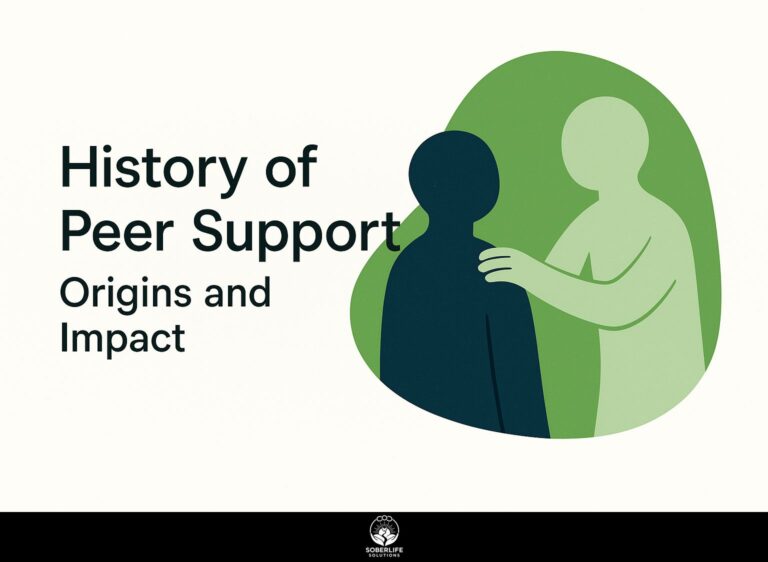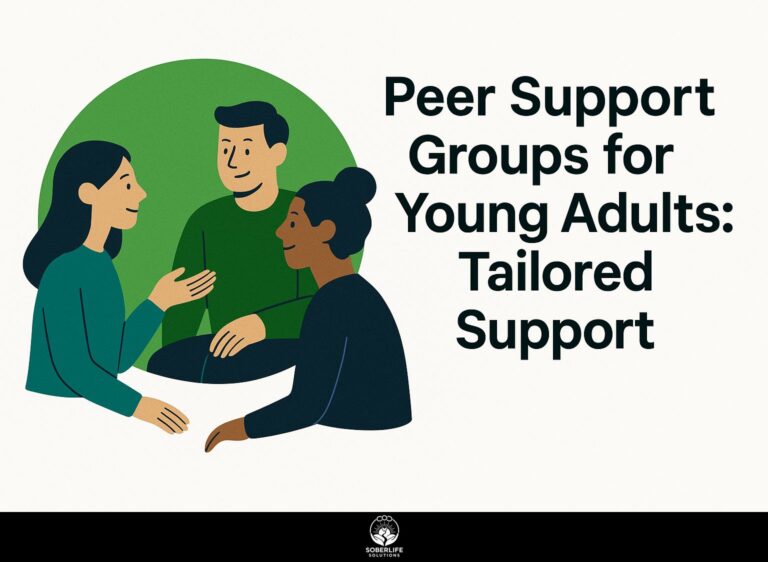Women for Sobriety: Principles and Membership Guide
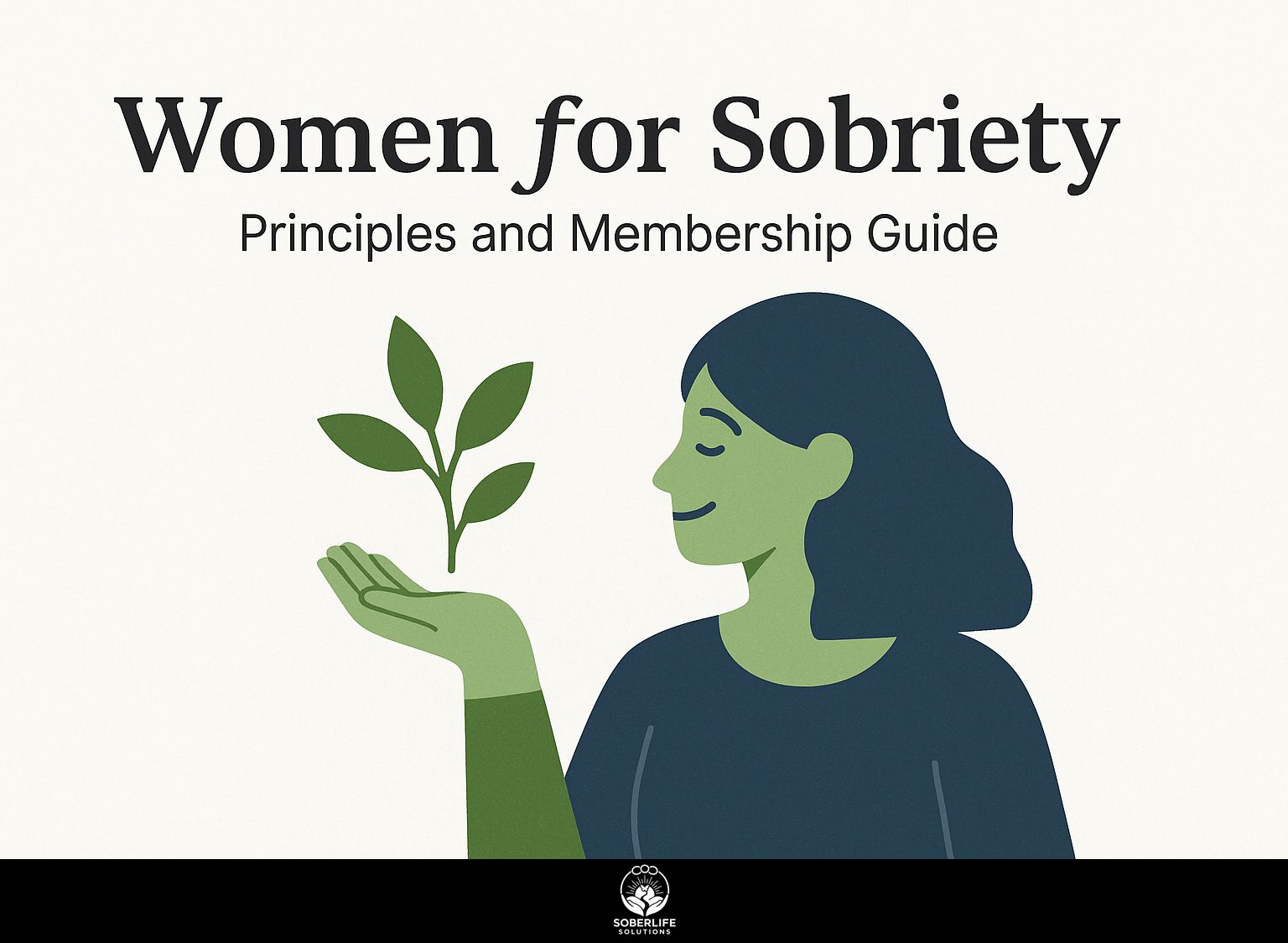
Learn how Women for Sobriety (WFS) helps women recovering from addiction with a special, supportive community started by Jean Kirkpatrick. Unlike traditional programs like Alcoholics Anonymous, WFS focuses on building self-esteem and personal growth. This guide explains WFS principles, the advantages of membership, and helpful resources to support your success in sobriety. If you want to connect with others or find useful resources, this article will help you on your path to a successful recovery.
Key Takeaways:
History and Mission
Women for Sobriety started in 1975, aiming to build a supportive group for women recovering from alcohol addiction. It focuses on self-awareness and personal growth.
WFS focuses on a complete approach for recovery, addressing the emotional, social, and spiritual aspects unique to women. The mission statement focuses on helping people feel confident and included in the group.
Programs include peer support groups, educational materials, and workshops focused on helping women with their unique challenges. By focusing on community and shared experiences, WFS builds strength, supporting women in creating healthier habits and staying sober through knowledge and empathy. Worth exploring: Alcoholics Anonymous: Definition, Purpose, and Meeting Types to understand different recovery support systems.
Core Values
WFS is focused on self-esteem, confidence, and positive thinking to help people overcome addiction.
These values are operationalized through techniques such as positive affirmations and cognitive-behavioral therapy (CBT).
For example, people can make their own affirmations such as, “I am in control of my choices,” which can strengthen self-confidence.
Integrating CBT involves identifying distorted thinking patterns and learning to replace them with constructive thoughts. Using these methods often helps build a stronger way of thinking, which aids in ongoing recovery. According to Healthline, there are various CBT techniques available that are effective in reinforcing these positive changes.
By following these main ideas, participants can create a helpful setting that encourages recovery.
Principles of Sobriety
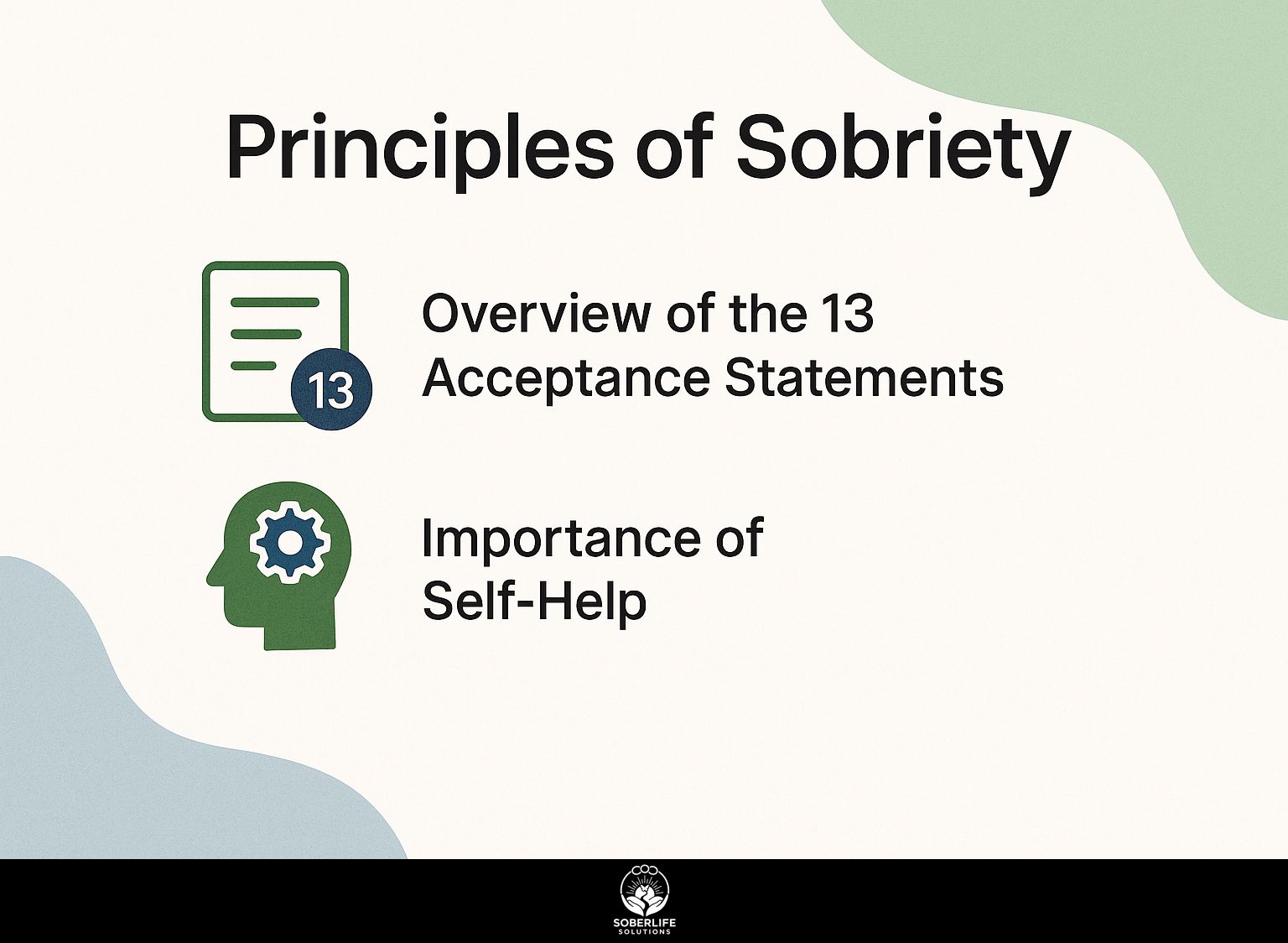
Women for Sobriety is built on thirteen statements that promote acceptance, personal development, and self-help for women in recovery. These elements are crucial as emotional health plays a fundamental role in maintaining sobriety. Explore effective coping mechanisms for addiction recovery that complement these principles.
Overview of the 13 Acceptance Statements
The thirteen acceptance statements provide clear guidance for women who want to achieve sobriety, promoting themes of self-acceptance and gaining personal strength.
These statements urge women to accept their path by focusing on forgiveness, strength, and self-improvement.
For instance, one suggestion could be to admit past errors while concentrating on upcoming goals. To apply this in daily life, consider journaling your thoughts and feelings each day-reflecting on challenges and celebrating small victories.
Another statement might point out how joining support groups is important for building relationships that strengthen responsibility and a sense of belonging.
Create actionable goals by identifying specific steps to integrate these principles into your routine, paving a path toward lasting recovery.
Importance of Self-Help
Self-help is important in WFS, encouraging members to get involved in community activities and take responsibility for their own recovery.
Using methods from cognitive behavioral therapy (CBT), WFS encourages individuals to take responsibility for their actions and develop personally. Members engage in self-reflection exercises to identify negative thought patterns that may lead to unhealthy behaviors.
They are encouraged to set achievable goals and monitor their progress through journaling, which helps reinforce their commitment to change. Participation in group discussions allows members to share experiences and strategies, promoting a sense of belonging and support.
This supportive setting encourages people to take charge of their decisions, leading to long-term recovery.
Membership Information
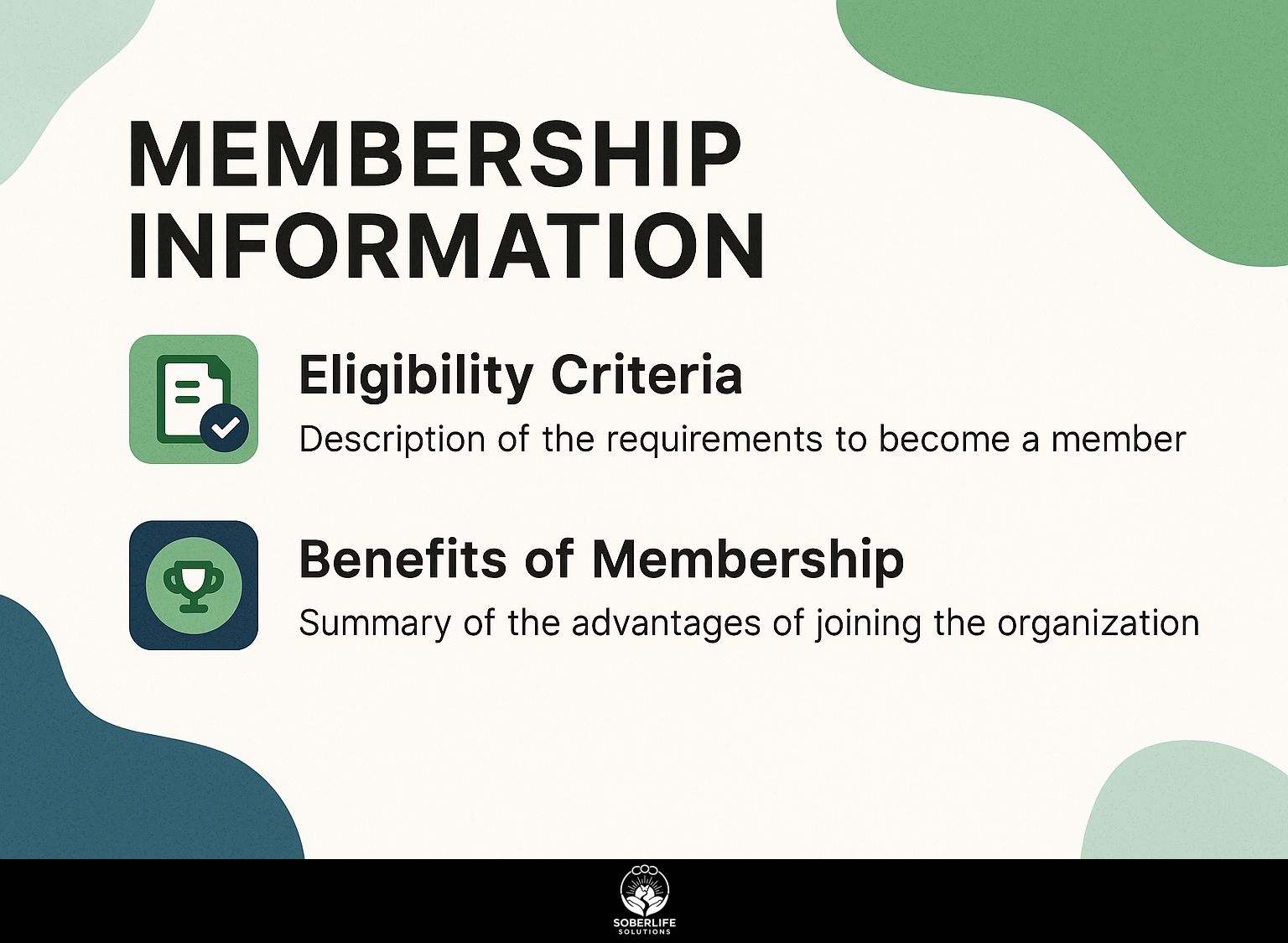
Joining Women for Sobriety provides plenty of support and resources designed especially for women going through their recovery process.
Eligibility Criteria
To become a member of Women for Sobriety, women must agree to abstain from alcohol and demonstrate a commitment to their recovery process.
Candidates need to be at least 18 years old and ready to take part in monthly meetings or online discussions, helping to build a supportive community. This commitment means talking about your own experiences and interacting with others, which helps create ways to manage difficulties.
Women interested in joining are encouraged to attend an introductory meeting, allowing them to understand the program’s values and approach to sobriety. By interacting with others who have shared goals, members can improve their recovery process.
Benefits of Membership
Membership in WFS provides access to a nurturing community, resources, and tools specifically designed for women in recovery.
As a member, you can join online meetings and workshops that focus on giving you the tools and strategies you need.
Individual recovery plans designed for your specific needs will lead you through the recovery process. You will have chances to meet people with similar experiences, creating relationships that can improve your progress.
Members often share success stories and ways to cope, building strong support that is very helpful during difficult times.
Support Resources
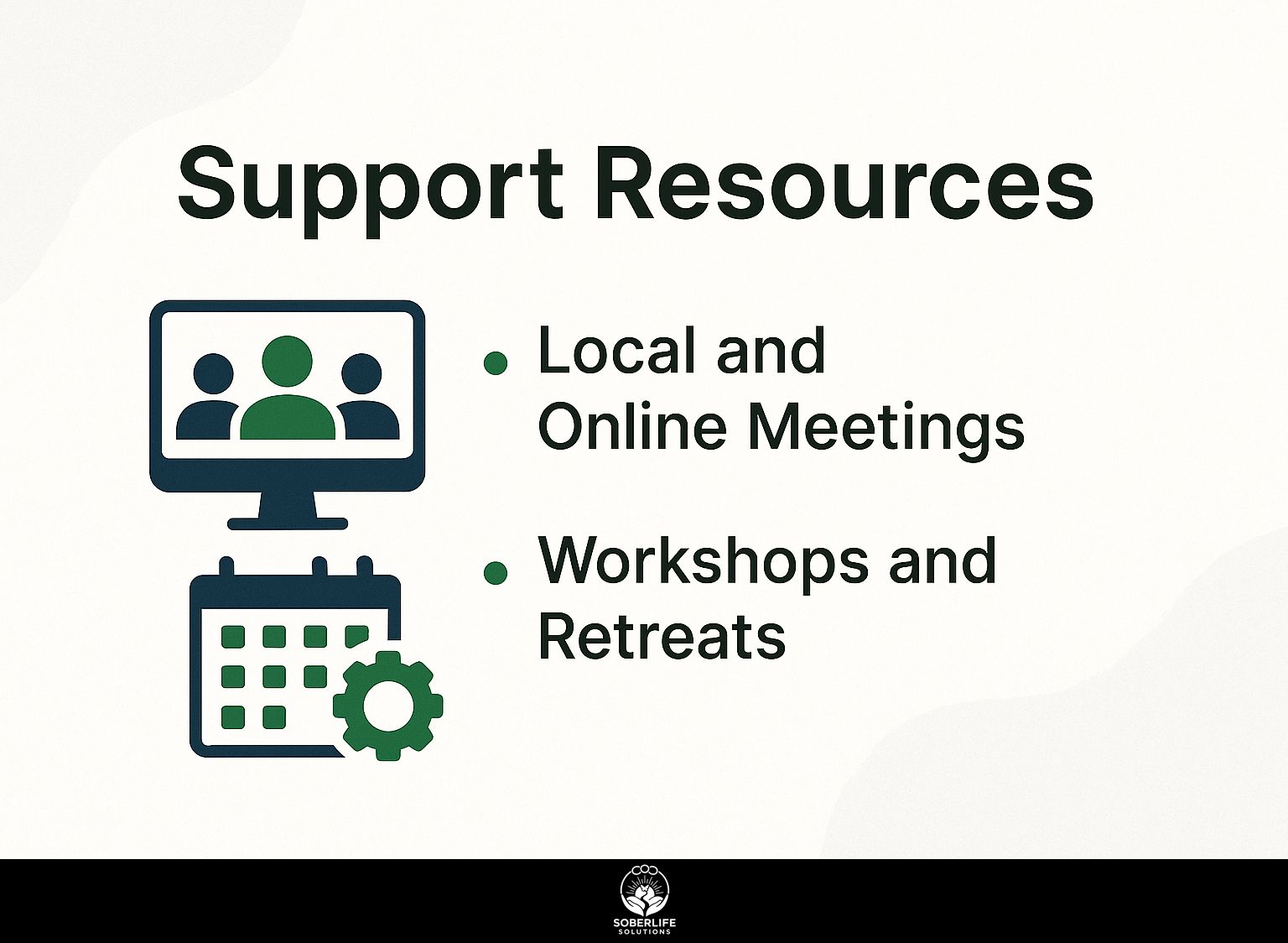
Women for Sobriety provides different support tools to help members connect with each other and develop personally. This approach aligns with the principles outlined in our analysis of how to join online support groups for alcohol recovery.
Local and Online Meetings
WFS organizes local and online gatherings so that women can get support no matter where they are or what they are facing.
Joining these meetings is simple. For local gatherings, members can often find announcements through community boards or via the WFS website, where they can RSVP to attend events in their area.
Online meetings use platforms like Zoom and Google Meet, which are easy for people to use and reach. Members will receive a meeting link via email, allowing them to join virtually.
This format lets people who are not physically present participate and helps everyone feel closer.
Workshops and Retreats
WFS organizes workshops and retreats that focus on personal growth, self-care, and community building for members.
These meetings are scheduled regularly, either monthly or quarterly, to cover topics relevant to personal development.
Workshops could have sessions to help improve self-esteem, with group activities and discussions to increase confidence.
Mindfulness activities like meditation and breathing exercises are often included, helping members stay present and lower stress.
Each retreat usually lasts a weekend, offering thorough exploration of these topics through hands-on activities and guidance from experts.
By participating, members learn useful skills and establish enduring relationships with others on similar paths.
Personal Development
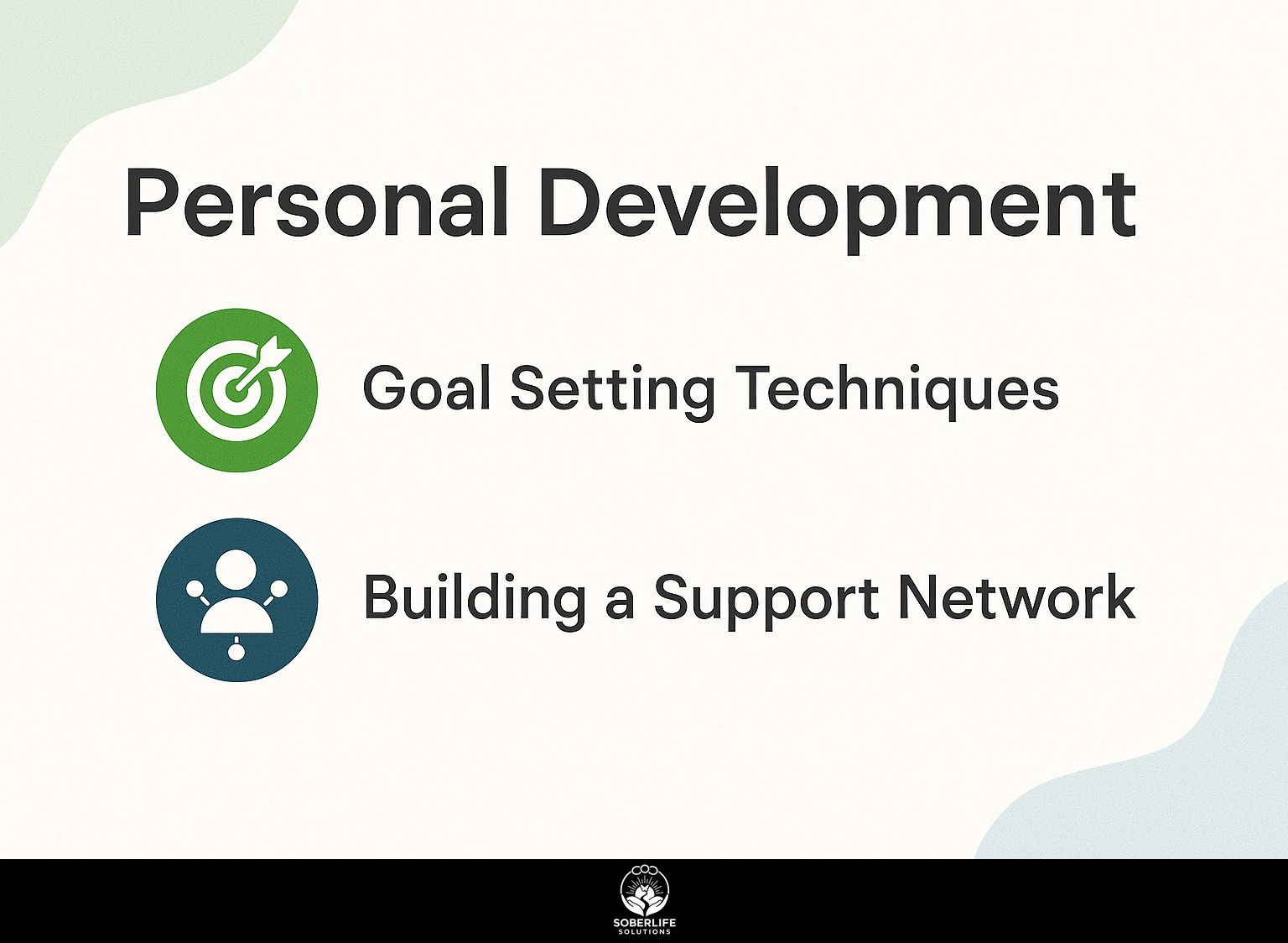
Personal growth is a main focus of WFS, helping women to establish goals and build a reliable support system during their recovery process.
Goal Setting Techniques
Setting clear and practical goals is important for personal development. WFS suggests members set SMART goals. These goals should be specific, measurable, reachable, relevant, and have a deadline.
Start using SMART goals by clearly stating what you want to achieve. For instance, instead of saying ‘I want to get fit,’ specify ‘I will exercise three times a week for 30 minutes.’
Tools like Trello or Asana can help you keep track of progress: set up a board for each goal and divide it into specific tasks you can act on. Give each task a due date to track your progress.
Setting up alerts and holding weekly meetings can help you stay responsible and concentrated. This organized method turns uncertain goals into clear steps you can reach.
Building a Support Network
Creating a strong support group is necessary for staying sober and feeling part of the WFS community.
- To build this network, begin by meeting other WFS members at local events or online meetings, which can help you make useful connections.
- Use social media sites like Facebook or Instagram to connect online, share experiences, and support each other.
- Think about joining WFS forums or discussion groups where you can talk about your experiences and challenges.
- Regularly commenting or joining discussions helps you feel seen and connected, supporting your commitment to sobriety.
Community Involvement
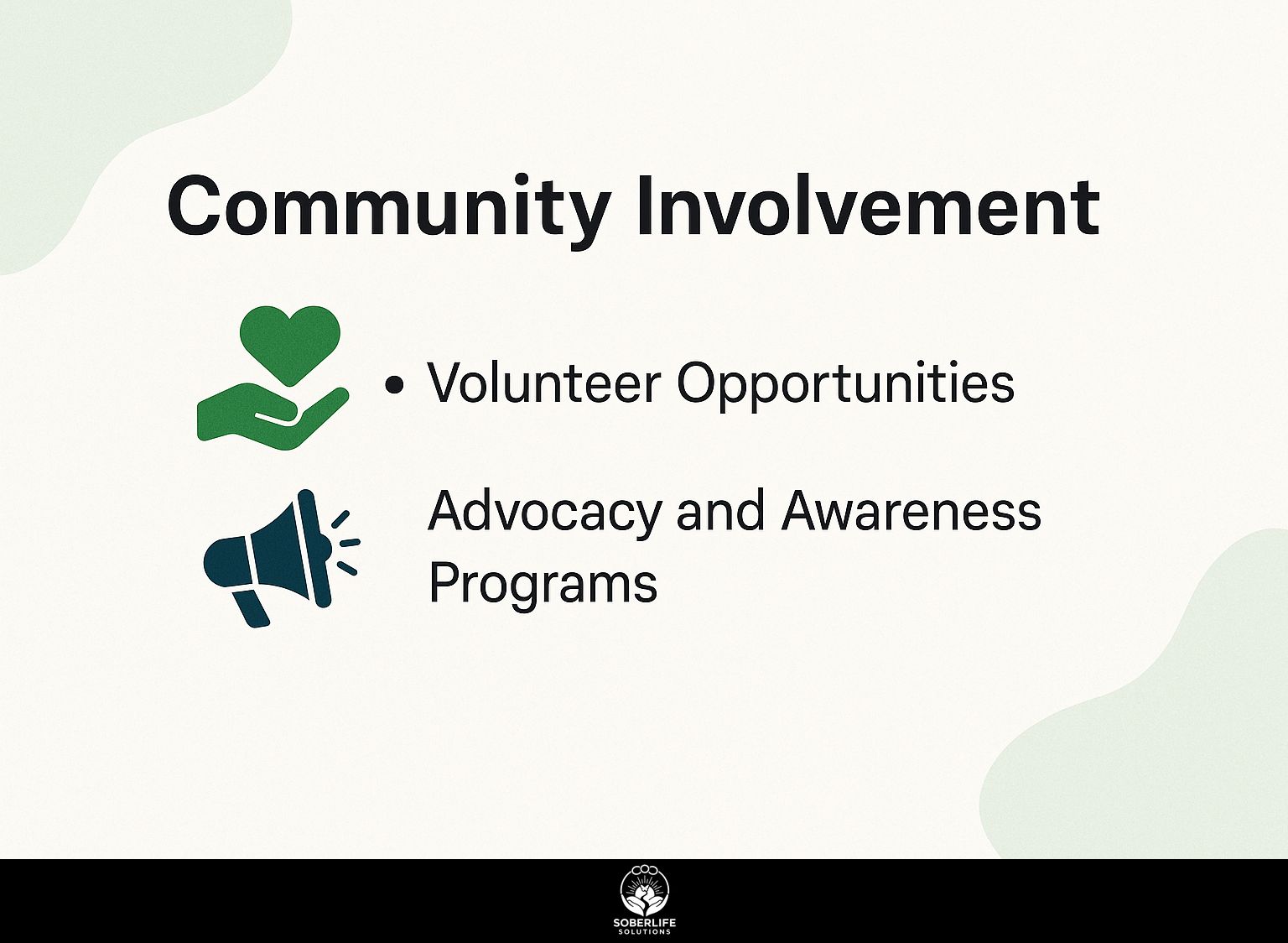
Community involvement is important at WFS, motivating members to take part in activities that increase awareness and provide support for women in recovery. Curious about how to participate in Recovery Month? Our step-by-step guide offers practical ways to engage and support recovery initiatives.
Volunteer Opportunities
WFS provides different volunteer options for members to connect with the community and help people in their recovery process.
Volunteer roles at WFS involve running workshops, which give members useful skills and help build a community feeling.
You can also participate in public awareness campaigns, helping to spread knowledge about recovery and reduce stigma.
Organizing events creates a platform for education and support, allowing members to connect in person.
For those interested, using tools like social media for outreach can improve the results of your efforts.
Each job helps others and makes your own recovery better.
Advocacy and Awareness Programs
WFS runs programs to inform and educate people about the challenges women face with addiction and recovery.
WFS collaborates with SMART Recovery to provide workshops where women learn practical methods to handle problems. These events help build community support and provide attendees with practical tools to manage their recovery process.
WFS participates in public speaking events that address the challenges women face, effectively raising awareness and promoting conversation. By increasing visibility around these issues, WFS helps to dismantle stigma and encourages broader community involvement in support initiatives. This aligns with efforts such as National Recovery Month organized by SAMHSA, which promotes awareness and understanding of recovery issues.
Frequently Asked Questions
1. What is Women for Sobriety and what are its principles?
Women for Sobriety is a nonprofit organization that provides support and resources for women struggling with addiction. Its principles focus on positivity, learning about oneself, and gaining confidence, and are explained in the “New Life” Program.
2. How is Women for Sobriety different from other addiction support groups?
Women for Sobriety focuses specifically on the needs and experiences of women in recovery, with a supportive and non-judgmental environment. Its principles focus on taking care of oneself and gaining confidence without depending on a higher power.
3. Can anyone join Women for Sobriety?
Yes, Women for Sobriety welcomes any woman who wants help with overcoming addiction. It is a safe and inclusive space for women of all ages, backgrounds, and beliefs.
4. What is the “New Life” Program and how does it work?
The “New Life” Program is the cornerstone of Women for Sobriety’s approach to recovery. It includes 13 guidelines that help people learn about themselves, think positively, and find healthy ways to deal with challenges. Members work through these principles at their own pace, with the support of the WFS community.
5. Do I have to attend meetings to be a member of Women for Sobriety?
No, while attending meetings can be beneficial for many members, it is not a requirement for membership. Women for Sobriety also offers online support and resources for those who may not have access to in-person meetings.
6. How can I become a member of Women for Sobriety?
To become a member, simply visit the WFS website and register for free. You will then have access to their online resources, forums, and can connect with other members for support. You can also choose to make a donation to support the organization and its mission.


